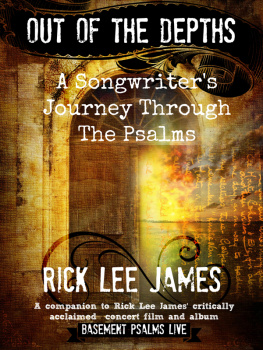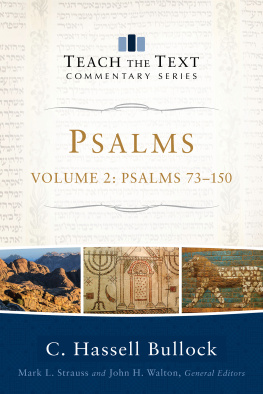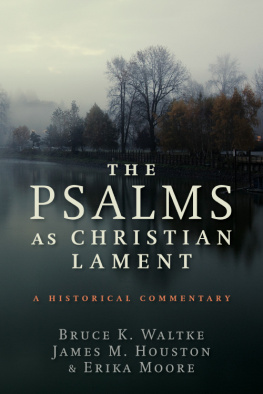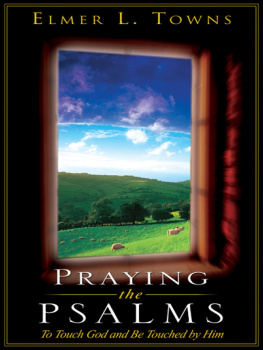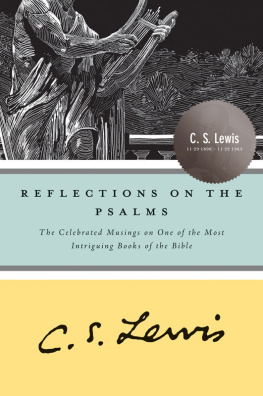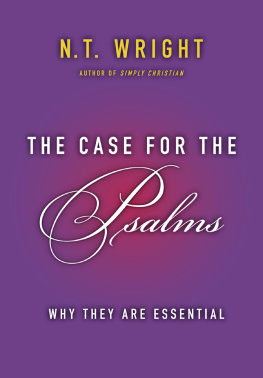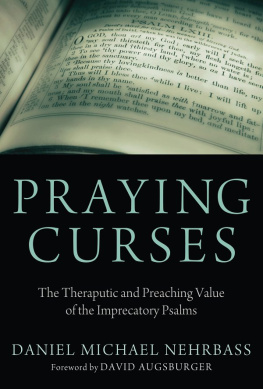Preface
MY SPECIAL INTEREST IN THE IMPRECATORY PSALMS was sparked by Dr. Martyn Lloyd-Jonesin the summer of 1969. In his last message at a pastors conference in Carlisle,Pennsylvania, Dr. Lloyd-Jones, preaching with resonant voice and relevant insight,said to us:
Look at the psalmist. Look at some of those imprecatory psalms. What are they? Thereis nothing wrong with them. Its just the zeal of the psalmist. Hes grieved andtroubled because these people are not honoring God as they should be. Thats hissupreme concern.
Dr. Lloyd-Joness words prompted me to look at the imprecatory psalms again. AsI read them, I was awed by these dramatic prayers for the annihilation of enemies.I gained a deeper appreciation for the Psalms in general, but I remained at a lossabout how certain psalms should be prayed and preached. I knew that all of our preachingand teaching of Gods Word must come from the context of Gods great love and theforgiveness we find in Jesus Christ. But how was I to pray and preach psalms of vengeance?
In the summer of 1983, I chose the imprecatory psalms as my area of specializationfor the Doctor of Ministry program at Westminster Seminary in California, and sobegan my formal study of them. I found that many theological disputes spring fromthe Psalms. One of the most important of these concerns who is speaking the psalmsof imprecation. The title and historical setting of various psalms help determinethe human author, but are these merely human words? This is a crucial issue. On theone hand, if Christ is the speaker, how can the guilty (penitential) psalms beunderstood? On the other hand, if David alone is the speaker, what do we do withthe self-righteous words of the psalms? Scholars have wrestled with these problemsfor centuries.
On a more personal level, the most penetrating question I needed to answer for myselfand others was, What is our relationship as Christians to the Psalms today? We needmore than a passive understanding to satisfy our minds: we need instruction for living !
Christians everywhere read the Psalms with much enjoyment and personal blessing.But as the Psalms are studied and considered in more detail, perplexing questionsinevitably arise. Many people in the congregations where Ive pastored have expressedmisgivings and bewilderment over the curses found in the Psalms. One of the purposesof this book is to provide a biblical response to such concerns.
I began my studies of the imprecatory psalms by reading them through many times,trying to determine their intrinsic significance as first written by the psalmistunder divine inspiration. I studied these cries for justice in the original Hebrewtext, as well as in some fifteen different translations. I read hundreds of commentariesand every article I could find, and as you can imagine, I exposed myself to manydiffering points of view!
I thank God that we have a great heritage of Christ-exalting literature on the Psalms.Unfortunately, many people have dismissed this literature in toto because it containsoccasional fanciful interpretations or exegetical quirks. Although both Augustineand Luther have quirks and fanciful thoughts at times, anyone who dismisses theircontributions deprives themselves of great riches. Part of the wealth of Spurgeons Treasury of David is the Quaint Sayings he mined and compiled from previous literature on the Psalms. Of more modern literature I have quoted several segments from thewritings of Dietrich Bonhoeffer, although I stand opposed to the theological campwith which he is often identified. To have ignored his profound insights would, Ibelieve, have been an unjustifiable loss to writer and readers alike.
Before putting into print the answers that I believe Scripture gives us to the puzzlingprayers of the Psalms, I first taught these principles and applications in a theologicalseminary several years ago. In addition, I have given seminars on the imprecatoryPsalms in the United States and parts of Latin America. Some of the pastors Ivehad the privilege of instructing in these seminars have become so excited with thesetruths that theyve begun to preach Christ from the Psalms for the first time. Manyhave requested that this book be published not just in English, but in Spanish aswell. One dear Colombian pastor was astonished to see how these psalms address thesocial needs of the suffering people of God in his country. He said, Latin Americaneeds to learn how to cry to God for justice and vindication in the name of Christ.No one has ever taught us to understand and preach Christ from these psalms!
To my knowledge, this is the first book of its kind in the English language. I hopeit will be the first of many, since there is so much more to be discovered and saidthan can possibly be contained in a single book. I pray that it may stimulate furtherstudy, prayer, preaching, and writing on the Psalms.
May God give us tears of love as we pray and preach these imprecatory psalms. Manyministers have cast them off, abandoning this part of Gods Word, with deadly resultsin their flocks. I believe with all my heart that embracing and proclaiming anewthe essential truths taught here will climax in the prosperity and advancement ofthe kingdom of God on the earth. When these holy prayers are again prayed in theSpirit and with understanding, there will come unsuspected power and glory to thechurch of Christ.
Break the teeth in their mouths, O God; tear out, O LORD, the fangs of the lions!Let them vanish like water that flows away; when they draw the bow, let their arrowsbe blunted. Like a slug melting away as it moves along, like a stillborn child, maythey not see the sun. Before your pots can feel the heat of the thornswhether theybe green or drythe wicked will be swept away. The righteous will be glad when theyare avenged, when they bathe their feet in the blood of the wicked.
Psalm 58:6-10
For the sins of their mouths, for the words of their lips, let them be caught intheir pride. For the curses and lies they utter, consume them in wrath, consume themtill they are no more. Then it will be known to the ends of the earth that God rulesover Jacob.
Psalm 59:12-13
Pour out your wrath on them; let your fierce anger overtake them. May their placebe deserted; let there be no one to dwell in their tents. For they persecute thoseyou wound and talk about the pain of those you hurt. Charge them with crime uponcrime; do not let them share in your salvation. May they be blotted out of the bookof life and not be listed with the righteous.
Psalm 69:24-28
Those Puzzling Prayers from the Psalms
HAVE YOU EVER BEEN PUZZLED BY THE PSALMS? Many of these beautiful Hebrew poems areobviously prayers, and it doesnt seem natural to most of us merely to read themas if we were listening in on someone elses conversation with God. In times of joyor deep sorrow and confusion, dont you frequently enter into the spirit of thePsalms and pray them as your own? But then, with your heart fully engaged in prayer,you come upon those phrases that seem so shockingso diametrically opposedto allyouve been taught in Christian love and forbearance.
How are you to understand a prayer from Scripture that says, Break the teeth intheir mouths, O God (Ps. 58:6) or Let death take my enemies by surprise; let themgo down alive to the grave (Ps. 55:15)? Thats strong language!


